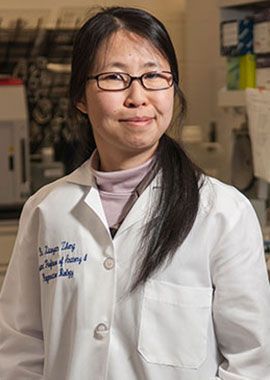
WASHINGTON (May 4, 2017)— Among scientists specializing in the area, the mechanisms behind the signaling function of the Hedgehog (Hh) receptor pathway remain a mystery. Xiaoyan Zheng, Ph.D., assistant professor of anatomy and regenerative biology at the George Washington University (GW) School of Medicine and Health Sciences (SMHS), who recently received a $1.7 million grant from the National Institutes of Health and National Institute of General Medical Sciences, is determined to learn more about the Hh pathway.
With this funding, Zheng will develop a comprehensive understanding of the pathway’s underlying mechanisms. Previous research has shown that the Hh receptor, Patched, regulates pathway activity. Studies have also shown that Hh pathway components are trafficked through the cilium of cells. This led Zheng to look at the possibility of ciliary trafficking as a crucial regulation point for the Patched component. The focus of her research is to look at the primary cilium’s role as the cellular platform for the process. Over the course of the study, Zheng and her team will employ the use of both cell lines and mouse models.
“A comprehensive understanding of the signal transduction will provide a better basis for the design and implementation of effective therapeutic approaches to diseases caused by malfunction of the Hh signaling pathway,” Zheng said.
The Hedgehog receptor plays an important role in embryonic development and adult stem cell function. A loss of signaling during development can result in birth defects, such as holoprosencephaly and congenital heart disease. Post-development loss is associated with a variety of cancer types.
Zheng received seed funding from the GW School of Medicine and Health Sciences and from GW Cancer Center to begin her research. Her mentors and colleagues at SMHS also provided feedback during the proposal process. Zheng also gives credit to Peter Nemes, Ph.D., assistant professor of chemistry at the GW Columbian College of Arts and Sciences, who has collaborated on the proposed research.
The project, titled “The Role of Ciliary Trafficking in Hedgehog Receptor Function” will be funded for a five-year period.


